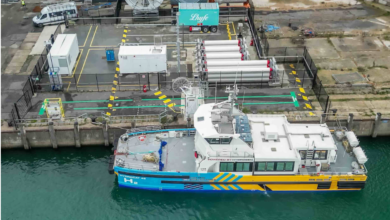Synthetic kerosene plant in Germany to go live today
The green hydrogen-based jet fuel plant will start its operation today to prove the feasibility of the process.

Synthetic kerosene (e-fuel) production plant, intended to supply green fuel to the aviation sector, will start production today (4th October) in Werlte, Lower Saxony, Germany.
The partners include Atmosfair, a German non-profit group leading the project; Siemens supported building the plant; Lufthansa will be the first customer to use the fuel.
The plant will produce around 8 barrels/day of kerosene which is a tiny amount compared to the 2.3 billion barrels consumption in 2019. The aim of the plant is to show the feasibility of the technology. The plant is considered the world’s first plant to produce green aircraft fuel on a commercial scale. The fuel will be produced synthetically from hydrogen and waste CO2 from food residues of a biogas plant using wind energy.
The biogas plant on-site produces CO2 in concentrated form as a waste product. The decomposition of organic material in a biogas plant produces methane and CO2 in relatively high concentrations. So, rather than releasing the CO2 into the atmosphere, it is used as a raw material for synthetic kerosene. Hydrogen is produced from the water via electrolysis based Proton Exchange Membrane (PEM) technology, supplied by Siemens Energy.
Fischer-Tropsch synthesis process will be used for hydrocarbons which is the feedstock for the refinery. At 150°C to 300°C, long-chain hydrocarbons are produced in the presence of metal catalysts, processed into kerosene at Heide refinery before it is shipped to Hamburg Airport.
Burning synthetic kerosene would emit as much CO2 as was previously extracted from the atmosphere to produce the green jet fuel, thus making it carbon neutral.
